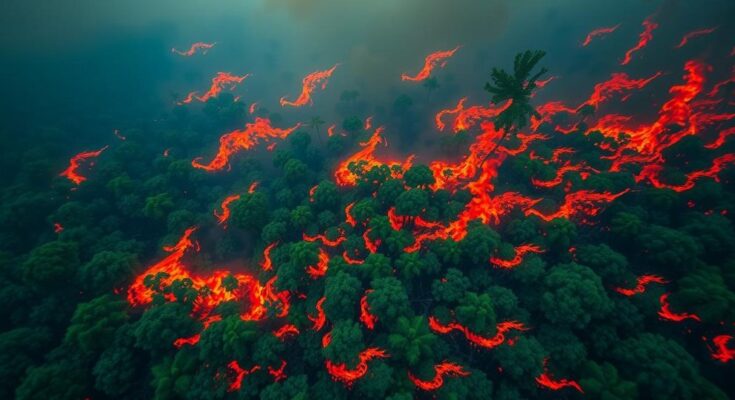Wildfires in Brazil’s Amazon rainforest have surged dramatically, leading to devastation of forest areas. The increase in fires is suspected to be exploited by criminals amid changing climate conditions. With profound implications for biodiversity and climate change, urgent action is necessary to address these challenges and implement protective measures for the forest.
Wildfires in Brazil’s Amazon rainforest have resulted in an unprecedented destruction of forest land, equivalent to an area the size of Switzerland. According to satellite assessments, this destruction is anticipated to take decades to recover, if recovery is even possible. The alarming data has become evident as the country experiences a shift in weather, with recent rains potentially ending the most severe drought recorded in Brazil’s history. The National Institute for Space Research reported an 846% increase in the area burned between January and mid-October 2024 compared to the same period in the previous year, surpassing the significant forest fires recorded in 2019. The timing of this surge in wildfires raises concerns among government officials and experts about the potential exploitation of these changes by criminal enterprises. Traditionally, the process of deforestation begins with illegal logging, where chainsaws are used to fell trees. However, as drought conditions have dried out the forest, criminals may forgo the laborious task of cutting down trees, opting instead to ignite dry vegetation using minimal tools such as gasoline. Ane Alencar, the science director at the Amazon Environmental Research Institute, noted that while drought exacerbates the spread of wildfires, the act of setting fires has been weaponized for illegal gains. Authorities indicate that this surge in wildfires is not merely a natural occurrence but is significantly influenced by human actions, fueled by both climate change and the El Niño phenomenon, which has led to two consecutive years of extreme drought. Such conditions have devastated river ecosystems, leaving communities stranded and wildlife at risk. By September 2024, wildfires further escalated, resulting in the most significant area burned in a decade of monitoring. One area particularly hit hard has been Jamanxim National Forest, known for illegal cattle ranching operations by landgrabbers, indicating that such illegal activities may be intensifying amid the climate crisis. The Brazilian government is contemplating policies requiring reforestation of burned areas, a potential deterrent against illegal land transformation.
The issue of rampant wildfires in Brazil’s Amazon is deeply intertwined with environmental, political, and criminal factors. Recent years have seen severe drought conditions affecting the region, leading to significant losses of forest cover. The Amazon rainforest plays a crucial role in regulating global climate, and deforestation contributes to worsening climate change. With the upcoming COP30 climate conference set in Belém, Brazil, the focus on forest destruction and its implications for climate change mitigation will be paramount.
The alarming rise in wildfires in the Amazon illustrates the profound impact climate change can have on ecosystems and the opportunities it creates for illicit activities such as land grabbing. Immediate and coordinated action is required from both local authorities and national governments to address the root causes of deforestation and implement measures to restore damaged ecosystems. Without such efforts, the Amazon rainforest’s resilience will continue to diminish, posing threats not only to local biodiversity but also to global climate stability.
Original Source: apnews.com




